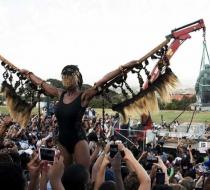As the statue falls, she rises in protest 1 Favorite
I was born in the 90s, but I’m not a Born Free; it was before South Africa became a democracy. Many believe that my generation doesn’t have anything to protest against. Given that police threw stun grenades at a student protest outside parliament last month, that is far from the truth.
I believe that South Africa’s memorialised public spaces are barren of the black female body, so last year I started doing performance art to draw attention to the issue. The character I’m portraying here depicts the statue of the Zimbabwe bird that was wrongfully appropriated from Great Zimbabwe by the British colonialist Cecil Rhodes. It currently sits in his Groote Schuur estate.
The Rhodes Must Fall protests had been going on for a month, kickstarted by an activist smearing his statue with excrement. I knew it was only a matter of time before the statue fell, but at 11am on 9 April my supervisor said: “It’s coming down today.” A friend helped me transport my plinth and wings. I arrived just before 2pm and was up on the plinth by quarter past. It was a little nerve-racking to be so high up because I was wearing high heels.
I looked at people’s phones and sunglasses, trying to see the reflection of the statue coming down. I saw the shadow move and thought, “This is the moment.” That’s when I lifted my wings. I was up there for four hours. I would hold up my wings for about two minutes, take a 10-minute break and then put them up again. My legs hurt, but I didn’t realise how sore my arms were until I came down – they were shaking. My feet were blue, I was sunburnt; I had heat stroke and blurry vision from looking directly into the sun. I felt like we were beginning to question this idealistic “rainbow nation”.
I’m not sure that we need statues at all – it’s a colonialist thing, like marking territory. My work is a response, to get people to look at the landscape with a different eye. People haven’t forgiven or forgotten, they’re still harbouring hatred. That’s why the statue needed to fall. It fostered the kind of thinking that is dangerous to a country in healing.
-taken from an interview with Sethembile Msezane by Erica Buist







